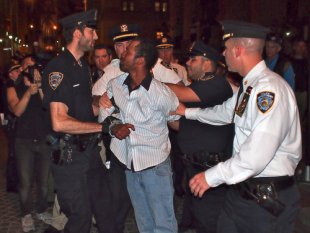
New York’s new Democratic mayor Bill de Blasio ran a significant portion of his election campaign on his promise to end the racialized policing practices of his predecessor, Michael Bloomberg. Law enforcement practices under Bloomberg, and Rudolph Giuliani before him, disproportionately targeted poor communities of color and led to the arrests of tens of thousands of people per year for carrying tiny amounts of marijuana.
Sadly, the city is currently on track to hit 28,600 marijuana possession arrests under the new de Blasio administration—on par with the average arrests during the Giuliani years. And similar to stats from Bloomberg’s time in office, minorities account for 86 percent of marijuana arrests so far this year, according to a new report from the nonprofit Marijuana Arrest Research Project.
The New York Times responded to the MARP report in a May 14 editorial, calling on the Bloomberg administration to “review Police Department policy to make sure these arrests are necessary and being fairly made.” More than 80 percent of people arrested in the US are blacks and Latinos, despite the fact that whites and minorities use marijuana at almost identical rates, as the Times editorial correctly points out. “And even though most cases are eventually dismissed, the arrests exact a cost: Young people who are even temporarily entangled in the courts can be shut out of jobs or denied entry into the armed services.”
On Wednesday MSNBC’s Ari Melber discussed the MARP report with Gabriel Sayegh of the Drug Policy Alliance and Mark Thompson of SiriusXM Radio.
“Almost any reform to our longstanding war on drugs is of course an automatic reform for racial justice, and that’s because our drug laws are enforced in such patently unfair ways,” Melber said at the opening of the segment.
Melber said despite expectations, deBlasio’s liberal administration “is still presiding over an aggressive and uneven policy of pot arrests.”
Thompson made the important distinction that policing policies like stop-and-frisk and targeting black neighborhoods are forms of institutionalized racism, which can be even more damaging than individual racist comments from people like Cliven Bundy and Donald Sterling.
“Sometimes this is even worse, because it directly affects more people, directly affects more minorities and it prevents them from getting jobs, prevents them from going to college. It has a widespread effect and it has to be done away with,” he said. “In a city and a state that supposedly is as progressive as New York, with a mayor who ran against this very issue, this is appalling and it is unacceptable.”
April M. Short is an associate editor at AlterNet. Follow her on Twitter @AprilMShort.















